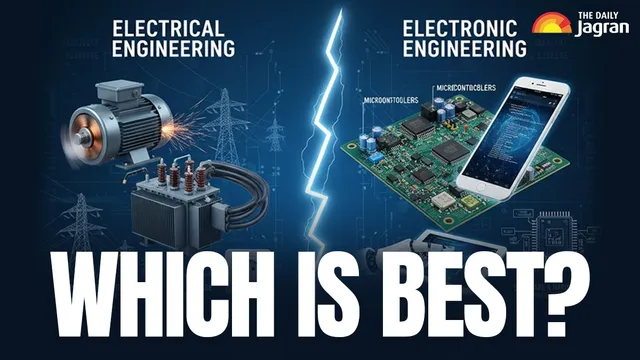- By Anshika Verma
- Thu, 13 Nov 2025 12:48 PM (IST)
- Source:JND
Electrical Engineering: Electrical Engineering is considered as the study and application of electricity, electronics, and electromagnetism. Those people who are involved in this field work in several sections such as power plants, how electricity changes forms and ensure that all the parts are working smoothly. Electrical engineers work on a wide range of tasks and projects. Basically, Electrical Engineers are hired to design, build, test, analyze, and document a full spectrum of simple to complex electric and electronic devices.
Electronic Engineering: Electronic Engineering is a sub field of electrical engineering which focuses on optimizing, creating and designing electronic devices. Basically, it is a smaller part of electrical engineering. These individuals fix electronic gadgets and complex systems that are generally used in daily life. Basically, they are the ones who bring the ideas for your newest phone or gadget to life and make it easy for people to use them. The easiest way to understand the difference between these two terms is that Electrical engineering is the main subject, whereas Electronic engineering grew out of it later.
Electrical Engineering vs Electronic Engineering:
1. Application: In electrical engineering, individuals will study about broader topics that handle strong power, like power plants, huge motors, transformers, and the high-voltage lines.
Electronic Engineering is the study of SMALL devices that handle weak power and are used in daily life.
2. Area of Focus: In Electrical engineering, individuals handle big systems and high voltage whereas in Electronic engineering handles small devices and low voltage. Electronic engineering is a part of electrical engineering.
3. Field of Study: Electrical Engineering mostly deals with systems and working of electricity and magnet working together. It also deals with power and control systems of an electric device. Electronic Engineering usually handles analog circuits, micro-chips, and light-based electronic devices
S.No. | Electrical Engineering | Electronic Engineering |
1. | Big Macroscopic System | Small Microscopic Components |
2. | High Power and high voltage | Low power and low voltage |
3. | Generating and moving power | Controlling and processing information |
Electrical engineers and electronic engineers often work side-by-side on several projects, whether they are creating a new product or making old products better for daily use.

